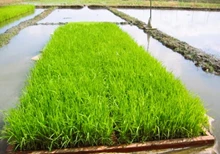
The Centre has cut the import tariff on edible oils — primarily palm group oils, soyabean oil, and sunflower oil — for the second time in a month as part of its plan to contain rising cooking oil costs and inflation. It is also a preventive measure since Kharif oilseed acreage has been impacted, while standing crops have been impacted by weather vagaries.
According to a notification issued by the Finance Ministry, the duty reduction went into effect on Saturday and will expire on September 30. Customs duty, coupled with additional infrastructure and development Cess, will be a consistent 24.75 percent for all crude edible oils, as per this. The tax on refined oils will be 35.75 percent.
Consumers benefit
The duty reduction would lower the price of crude palm oil by Rs. 4180 per ton, crude degummed soyabean oil by Rs. 4990, and RBD palmolein by Rs.4330 per ton for consumers. The Centre proposed the second import duty decrease while prices for all edible oils remain high at more than 125 per kg. In comparison to the previous year, the rates have increased by 21-54 percent.
Edible oil prices are rising as a result of Covid's impact on palm oil production in Malaysia and Indonesia, while soyabean and sunflower oil prices are rising owing to supply concerns from Brazil, the United States, and the Black Sea. Prices have begun to fall globally in recent days.
Prospects for Kharif
Inflation has also been a source of concern for the Centre. However, retail inflation fell to 5.59 percent in July.
The Centre appears to be concerned about the prospects for Kharif oilseeds as well. According to the most recent Ministry of Agriculture data, the area under oilseeds is decreased by 3.15 lakh hectares (lh) this year, to 192.56 lh, compared to the previous year. The area under groundnut has decreased by more than 2 lh, whereas soyabean coverage has increased somewhat.
However, the Soyabean Processors Association of India claimed that rains had damaged at least 8 lh of the Kharif season's primary oilseed crop area, while rains have harmed 13% of the planted area of 121.67 lh.
The low arrival of rapeseed/mustard, the primary crop of the Rabi season, has also contributed to the solid trend in edible oil prices. According to the Solvent Extractors Association of India, edible oil prices are trending in a mixed direction, with CPO, rapeseed/mustard, and groundnut oils rising and the rest falling.
In addition to these steps, the Centre has requested states to direct retailers to clearly display the pricing of all edible oil brands for the benefit of customers, as well as to take action against hoarding at the wholesaler, miller, and refiner levels. A stock restriction has also been placed on dealers, according to Sudhansu Pandey, the Union Food Secretary. He has also alluded to the potential of a price restriction on edible oils.
The duty reductions already implemented amount to an estimated 3,500 crore over the course of a year. With the latest decreased import duty of Rs.1100 crore for the entire year, the overall direct value of benefits projected to be passed on to consumers in terms of duties waived by the government is Rs.4600 crore, according to a government release.











